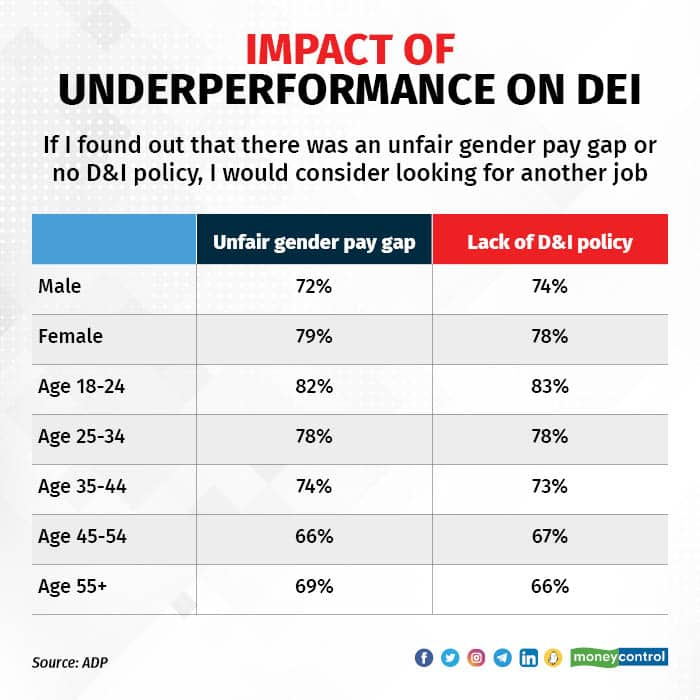
Diversity, equity and inclusion are very important for GenZ and millennials. In India, 85 percent of young workers between the ages of 18 to 24 feel there is a lack of diversity and inclusion policies and 82 percent feel that a gender pay gap exists and is unfair, according to a recent report.
Further, 83 percent of young workers say that if they found out that there was an unfair gender pay gap, or no diversity and inclusion (D&I) policy, they would consider looking for another job. If employees feel that their organisation is not taking the right steps toward an inclusive system, it often leads to a loss of interest in the job and ultimately, this is a loss for the organisation, according to ADP Research Institute’s People at Work 2022 report.
Although women have been more vocal about the issue, men are not far behind. Further, 62 percent of employees in India accept that their organisation has a gender pay equality policy and acknowledge its importance. However, this percentage is lower for D&I policies (58 percent).
While half of the workers surveyed globally (50 percent) say their employer has become better at gender pay equality compared to three years ago and believe D&I has improved, more than one in 10 believe there has been a decline (11 percent for pay equality and 13 percent for diversity and inclusion).

Management teams, company owners and HR departments are cited as the primary drivers of gender pay equality and diversity and inclusion within companies, but in a third of the cases (33 percent), workers say it is up to employees, and one in seven (15 percent) say no one is taking the initiative.
“Employees in India strongly consider factors such as workplace ethics and culture when deciding whether to join or remain with their employer. And they are willing to leave when employers fail to create a diverse workforce and treat them fairly,” says Rahul Goyal, MD, ADP India.
“The ramifications could go further, adversely affecting the way a company, its values and brand could be perceived by staff and candidates, as well as customers and shareholders,” he adds
Indian workers want change
Indian workers are the most likely in any country globally to have considered a major career change in the last 12 months. Almost nine in 10 (88 percent) have done so, compared to 75 percent in Singapore, 68 percent in Australia, and 61 percent in China.
This may be due — in part, at least — to only one in eight (12 percent) Indians and Singaporeans feeling that their job or industry is secure. Indians are the most entrepreneurial regionally, with almost three in 10 (29 percent) contemplating starting their own business.
Flexibility of hours is important to 43 percent of workers in Australia, 42 percent in Singapore, and 31 percent in India and China. Enjoyment of the day’s work is key for around two in five Chinese and Australian workers (39 percent and 38 percent) and for one in three Singaporean workers (32 percent), but only just over one in five in India (22 percent).
ADP Research Institute surveyed 32,924 workers in 17 countries around the world between November 1 and 24, 2021.
More than nine in 10 workers say they’re satisfied with the job
Job satisfaction is widespread, particularly in India, where more than nine in 10 workers say they’re satisfied in their current employment. In Singapore, however, the feeling is more muted. There, less than a third (31 percent) describe themselves as being very satisfied, while just over half (52 percent) are ‘somewhat’ satisfied (compared to 61 percent and 31 percent in India, respectively).
Similarly, despite feelings of insecurity around jobs or industry sectors in some quarters, optimism about the next five years in the workplace is strong, with 90 percent of Indian and Chinese workers feeling this way. This suggests many people see any changes they may have to make to their careers as an opportunity, rather than a threat. However, again, sentiment in Singapore is less bullish.
